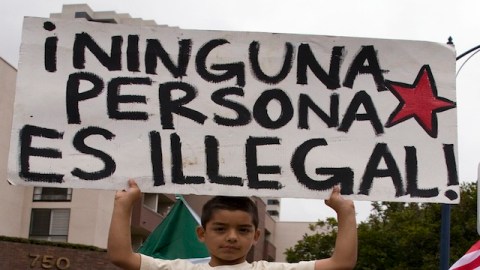Jack Shafer, Jose Antonio Vargas, and Terrible Secrets

In his recent essay, “My Life as an Undocumented Immigrant,” star reporter Jose Antonio Vargas recalls being sent to the U.S. at the age of 12 to live with his grandparents, naturalized American citizens. He says he thought he was a legal immigrant until the DMV rejected his application for a learner’s license four years later.
For the next 14 years, Vargas concealed his immigration status, which involved forging documents and lying to his bosses in order to keep living and working in America.
Jack Shafer of Slate has a bizarre reaction:
I get on my high horse about Vargas’ lies because reporter-editor relationships are based on trust. A news organization can’t function if editors must constantly cross-examine their reporters in search of deliberate lies. I’m more disturbed with Vargas for lying to the Washington Post Co. (which—disclosure alert!—employs me) than I am about him breaking immigration law. His lies to the Post violated the compact that makes journalism possible. It also may have put the company on the hook for violating immigration law [PDF], which slaps employers who knowingly employ illegal immigrants with legal sanctions and fines. This may be the case in the Vargas episode: In his story, he writes of telling one Post manager about his immigration status, and that manager, Peter Perl, took no action.
Vargas says he has apologized to his former employers and that everyone he names in the piece gave him permission to do so.
Shafer stresses at the outset that he’s an “immigration dove” who believes in “open borders.” Yet he’s angry at Vargas for lying to his editors. What was Vargas supposed to do? Give up and go home?
Shafer attempts to draw a strange parallel between resume fraud and concealing one’s immigration status:
LikeJanet Cooke, Vargas lied about who he was. Cooke would never have gotten her job at the Washington Post, would never have written “Jimmy’s World,” would never have won a Pulitzer Prize if she hadn’t misrepresented herself on her résumé as a Phi Beta Kappa graduate of Vassar.* It may be unjust that Cooke, a black woman and a good writer, couldn’t have made the jump to the then-Ivy-centric Post at the age of 25 if she had been honest about her humble University of Toledo undergraduate degree. But the unjustness of the world didn’t give her a license to lie to the Post, where she eventually told many more. Likewise, Vargas would never have been hired by the Post had he told the paper the truth about his immigration status. I know the two lies aren’t exactly analogous. Cooke told her lies to inflate her status, Vargas to normalize his. But the fact that Vargas lied about his noncompliance with what I (and others) consider to be an unjust law cannot be waved off. The trouble with habitual liars, and Vargas confesses to having told lie after lie to protect himself from deportation, is that they tend to get too good at it. Lying becomes reflex. And a confessed liar is not somebody you want working on your newspaper.
There’s a big difference between habitual lies and terrible secrets. By “terrible secrets,” I mean facts that would ruin a person’s life if they came to light, but which are not in themselves shameful.
Resume fraud is wrong. Cooke chose to lie to get ahead. Whereas, Vargas was initially trapped by someone else’s lie and forced to keep up appearances to keep his life from imploding.
Vargas was sent here as a child. He wasn’t responsible for what happened to him. As a self-proclaimed “immigration dove,” Shafer doesn’t seem to think that it’s inherently morally wrong to stay in the U.S. out of status. He’s not saying that Vargas had a duty to pack up and move back to the Philippines as soon as he turned 18.
Shafer is trying to have it both ways. He doesn’t want to condemn Vargas just for staying. But the thing is, all undocumented immigrants have to lie about their status, or live in the shadows where nobody asks too many questions.
Shafer is engaging in special pleading that it’s especially wrong for journalists to lie to their bosses. His argument is that if a journalist would lie about anything, everything they write is suspect. That’s simplistic. The fact that someone is willing to lie to save life as they know it says little about their willingness to lie in ordinary circumstances.
Would Shafer say that every closeted gay journalist who comes out in mid-career should henceforth be treated as a pariah? After, all, coming out means owning up to years of lying. What about a battered woman who takes a new identity in order to flee her abusive ex? Should she be cast out of journalism if her editors find out who she really is? What about someone who was assigned a new identity as a child because his father was in the Witness Protection Program?
It’s easy to portray Vargas—a self-described hard worker and American dreamer—as a victim of the system. As my colleague Alex Massie put it on Twitter this afternoon in response to my critical tweets, “But what was Vargas supposed to do? Pick fruit for the rest of his life?” No, I wouldn’t sentence anybody to a life of fruit-picking, and yes, he and other illegal aliens are sympathetic characters. But Vargas’ truth-telling about his lies, which included an extensive sit-down with ABC News, deserves additional scrutiny before any of the former bosses and employers he has “reached out to” with apologies “for misleading them” accept them.
In effect, Shafer’s stance implies that undocumented migrants should be relegated to fruit-picking and other jobs where bosses regard workers as interchangeable warm bodies.
Yes, the relationship between a journalist and an editor is built on trust. Indeed, trust is integral to any well-paid white collar job. We have to trust our doctors, lawyers, engineers, teachers, and scientists, too. What kind of “immigration dove” thinks that undocumented migrants are okay as long as they don’t achieve any position of trust or authority?
Instead of condemning Vargas for doing what any reasonable person would do under the circumstances, Shafer should be championing the DREAM Act (Development, Relief and Education for Alien Minors)–a bipartisan bill that would allow undocumented immigrants who were brought here as children, and go on to graduate from U.S. high schools, to earn lawful residence and, upon certain conditions, citizenship.
There is a germ of truth in Shafer’s argument. A system that forces otherwise honest people to lie is self-corrosive. Passing the DREAM Act wouldn’t just benefit young immigrants, it would benefit everyone by eliminating a systemic barrier to trust and social solidarity.
[Photo credit: michaelrighi, Creative Commons.]





